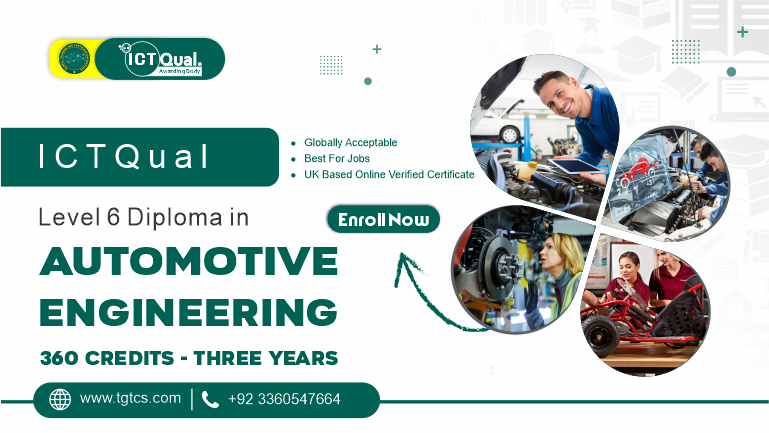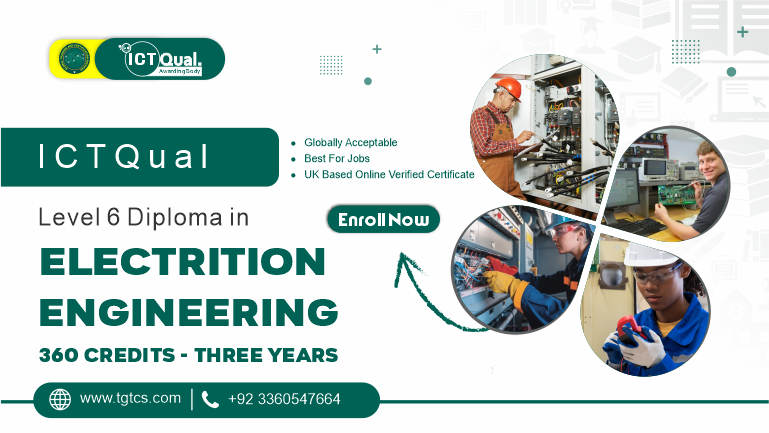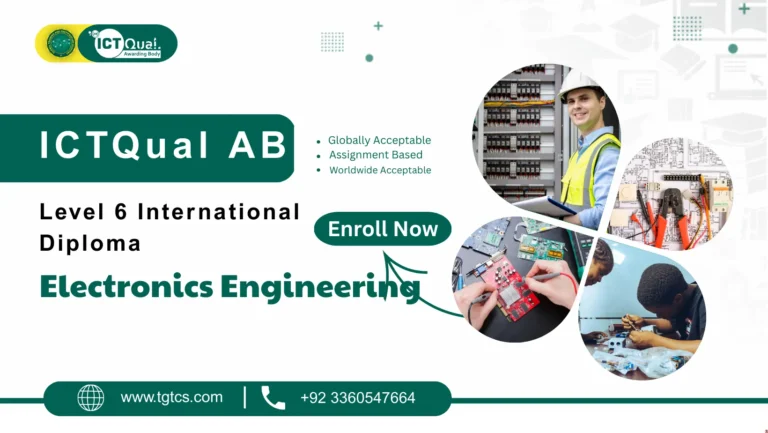ICTQual Level 2 Diploma in Automotive Engineering 30 Credits – 3 Months
The ICTQual Level 2 Diploma in Automotive Engineering is a comprehensive qualification designed to equip learners with essential skills in automotive technology, maintenance, and repair. Over the course of 3 months, students will gain practical experience in working with various types of vehicles and machinery. The diploma covers vital aspects of automotive engineering, including engine diagnostics, mechanical repairs, vehicle electrical systems, and much more.
This qualification offers 30 credits upon successful completion, which makes it an excellent starting point for anyone looking to enter the automotive industry, whether you’re a complete beginner or looking to formalize your existing skills.
If you have a passion for cars and want to start a career in automotive engineering, the ICTQual Level 2 Diploma in Automotive Engineering is the perfect place to begin. With its practical focus, industry-recognized qualification, and a short, 3-month duration, this course offers everything you need to get your career started quickly. Whether you’re aiming for hands-on roles like an automotive technician or looking to specialize in advanced automotive technologies, the ICTQual Level 2 Diploma provides the skills and qualifications to help you succeed in this growing and exciting industry.
The Global Training and Certification Services (TGTCS) is Directly Approved Training Centre of ICTQual
The ICTQual Level 2 Diploma in Automotive Engineering is a comprehensive, hands-on qualification designed for individuals looking to start a career in the automotive industry. This 3-month course, worth 30 credits, covers a wide range of key topics essential for automotive engineering, including engine diagnostics, vehicle maintenance, and repair of electrical and mechanical systems. Students will gain practical experience in diagnosing and repairing vehicles, working with various automotive components, and learning about health and safety practices in automotive workshops.
The course provides a solid foundation for entry-level roles in the automotive sector, such as automotive technician, vehicle maintenance engineer, and diagnostic technician. It is ideal for those with a passion for cars and a desire to enter the workforce quickly with a recognized qualification. Graduates will be equipped with the essential skills and knowledge needed to excel in a variety of automotive engineering roles and have the option to further their studies with advanced qualifications or specialized training.
This diploma not only prepares students for employment but also offers opportunities for further development in specialized areas, such as electric vehicle (EV) technology or vehicle electronics. The ICTQual Level 2 Diploma is a fast and flexible pathway into the automotive industry, offering a strong career start for motivated individuals.
Unit 1: Fundamentals of Automotive Engineering
By the end of this unit, students will be able to:
- Understand the core principles of automotive systems, including engine operation and drivetrain mechanics.
- Identify key components of a vehicle and explain their functions.
- Use basic tools and equipment effectively for automotive repairs.
- Apply safety and compliance protocols in an automotive environment.
Unit 2: Vehicle Diagnostics and Maintenance
By the end of this unit, students will be able to:
- Perform basic diagnostic procedures to identify issues in engine and electrical systems.
- Conduct maintenance on key vehicle systems, such as brakes, suspension, and steering components.
- Troubleshoot and resolve common mechanical and electrical problems.
- Use diagnostic tools and software to assess and ensure vehicle functionality.
Unit 3: Applied Automotive Skills in a Workshop Environment
By the end of this unit, students will be able to:
- Demonstrate hands-on skills in servicing and repairing vehicles within a professional workshop environment.
- Apply theoretical knowledge to practical tasks involving real-world automotive systems.
- Work effectively as part of a team in a workshop setting.
- Complete a service and repair project, demonstrating both practical and diagnostic skills.
Mandatory Units
The Units of ICTQual Level 2 Diploma in Automotive Engineering are as ;
- Fundamentals of Automotive Engineering
- Vehicle Diagnostics and Maintenance
- Applied Automotive Skills in Workshop Environment
The Course Benefits of ICTQual Level 2 Diploma in Automotive Engineering are as :
Industry-Relevant Skills and Knowledge
The ICTQual Level 2 Diploma in Automotive Engineering provides students with essential, industry-recognized skills that are directly applicable in the automotive sector. Through hands-on experience and a curriculum focused on engine diagnostics, vehicle maintenance, and repair, students gain the practical skills needed to work effectively in automotive workshops and service centers.
Fast-Track Qualification
This diploma can be completed in just 3 months, making it a fast and efficient way to enter the automotive engineering field. Students are able to gain valuable qualifications in a short amount of time, allowing them to pursue career opportunities without the need for years of study.
Comprehensive Curriculum
The course covers a broad range of key topics, including vehicle diagnostics, repair of mechanical and electrical systems, and proper use of diagnostic tools. Students will leave the course equipped with a well-rounded knowledge of automotive engineering, making them job-ready and highly competitive in the industry.
Hands-On Experience
Students will gain practical, hands-on experience working with real vehicles and automotive systems in a workshop environment. This practical approach ensures that students are not only learning theory but are also mastering the skills required for real-world automotive repairs and diagnostics.
Career Opportunities in a Growing Industry
Automotive engineering is a rapidly expanding field, with a consistent demand for skilled technicians. Upon completing this diploma, graduates will be qualified for various entry-level positions, such as automotive technician, vehicle maintenance engineer, and diagnostic technician. The qualification opens the door to a wide range of career opportunities in the automotive sector.
Pathways to Further Education and Specialization
The ICTQual Level 2 Diploma serves as a stepping stone for further study in automotive engineering. Graduates can progress to Level 3 qualifications for more advanced knowledge and specialization, such as hybrid and electric vehicle technology, vehicle electronics, or performance tuning. The diploma also provides the foundational skills for pursuing apprenticeships or advanced training.
Increased Employability
With a strong focus on employability skills, the course ensures that graduates are ready to contribute to automotive teams immediately. The diploma provides an edge in the competitive job market, making graduates more attractive to potential employers in the automotive industry.
Hands-On Problem-Solving Skills
Students develop critical thinking and problem-solving abilities as they diagnose and troubleshoot real automotive issues. These problem-solving skills are essential in the workplace and set graduates apart in their ability to handle complex challenges.
Flexibility and Accessibility
The course offers flexibility, making it ideal for students who want to balance work, study, or other commitments. With both full-time and part-time options available, students can tailor their learning to fit their schedules.
Foundation for Entrepreneurial Ventures
For students with an entrepreneurial mindset, the skills gained through this diploma can be used to start an automotive business, such as a repair shop, diagnostics center, or even offering specialized services like vehicle customization. The course provides a solid foundation for future business owners in the automotive industry.
The ICTQual Level 2 Diploma in Agricultural Engineering is ideal for individuals who are passionate about agriculture and looking to build a career in agricultural engineering. The course is suited for learners who are either new to the field or already have some basic knowledge of farming practices and machinery and want to develop more specialized skills.
Key characteristics of the ideal learner include:
- Interest in Agriculture and Engineering
The ideal learner is someone who has a keen interest in agricultural technology, machinery, and engineering. They may have a background in farming or mechanical work and are eager to apply their skills in the agricultural sector. - Practical, Hands-On Learner
This course is highly practical, so the ideal learner should be someone who enjoys hands-on work, whether it’s operating machinery, performing maintenance, or troubleshooting mechanical problems. Learners who are comfortable working with tools and equipment will excel in this course. - Motivated and Career-Oriented
The course is designed for those who want to quickly enter the workforce with a recognized qualification. The ideal learner is motivated to pursue a career in agricultural engineering and is dedicated to gaining the skills necessary to become job-ready in just three months. - Safety and Sustainability Focused
Given the emphasis on health, safety, and environmental practices, the ideal learner should value these principles and be committed to following safety protocols and reducing environmental impact in agricultural settings. - Problem-Solver
The ideal learner enjoys troubleshooting and solving practical problems. With a focus on diagnosing and repairing machinery, the learner should be someone who can think critically and apply their technical knowledge to overcome challenges in the agricultural environment. - Flexible and Adaptable
Since the course offers flexible study options, the ideal learner may be balancing other commitments, such as part-time work or personal responsibilities. The learner should be able to manage their time effectively and be adaptable to different learning formats.
Progression Routes
Upon successfully completing the ICTQual Level 2 Diploma in Agricultural Engineering, students have several exciting career progression options to further advance in agricultural engineering and related fields. Here are some potential pathways:
- Level 3 Qualifications in Agricultural Engineering
Graduates can progress to a Level 3 Diploma or Advanced Certificate in Agricultural Engineering, which offers more specialized knowledge and skills. This qualification is ideal for those looking to take on more complex roles, such as agricultural engineering technician, field service engineer, or machinery specialist. - Apprenticeships in Agricultural Engineering
The Level 2 diploma also opens up opportunities for apprenticeships, where students can gain practical, hands-on experience while working alongside industry professionals. These apprenticeships combine on-the-job training with theoretical learning, providing a direct route to skilled positions in the agricultural sector. - Specialized Training in Advanced Agricultural Technologies
As technology continues to revolutionize agriculture, graduates can pursue specialized training in areas such as precision farming, automation, or drone and sensor technologies for crop management. These advanced skills are in high demand and offer opportunities to work in cutting-edge roles that shape the future of farming. - Entry-Level Employment in Agricultural Engineering
The ICTQual Level 2 Diploma qualifies graduates for a variety of entry-level roles in agricultural engineering, including:- Agricultural Machinery Technician
- Equipment Maintenance Engineer
- Farm Equipment Operator
- Agricultural Engineer Assistant
These positions provide valuable industry experience and serve as stepping stones to more senior roles as graduates gain additional expertise.
- Entrepreneurial Opportunities in Agriculture
For those with an entrepreneurial mindset, the diploma lays the foundation for starting a business in agricultural engineering. This could include services such as machinery maintenance and repair, agricultural equipment rentals, or the development of innovative farming technologies. - Sustainability and Environmental Engineering Careers
With increasing demand for sustainable agricultural practices, graduates can explore careers in environmental engineering or sustainability consulting. These roles focus on implementing eco-friendly technologies and practices to minimize the environmental impact of farming.
Course Overview
Course Level
Level 2
Course Units
03 Mandatory Units
Duration
3 Months






